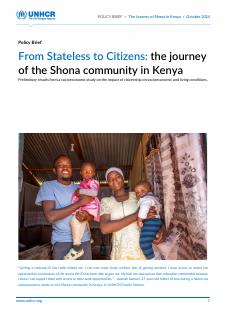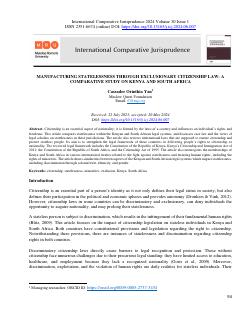“Nubians are still facing challenges on access to nationality and citizenship. This has limited them from accessing services such as healthcare, securing job opportunities or even ownership of land.”
KEY ISSUES
- The restrictive nature of the citizenship law and discrimination in its implementation mean that many people who are members of minority communities struggle to obtain documentation of Kenyan citizenship.
- In recent years, the Kenyan government has awarded nationality to specific stateless groups, such as the Makonde in 2016, Shona in 2021, and Pemba in 2023.
- There is no comprehensive data on how many people are affected by statelessness in Kenya today.
- Kenya’s 2010 Constitution removed gender discriminatory nationality provisions and provided for nationality to be granted to foundlings. However, Kenyan law still contains inadequate safeguards – stateless children born in the country do not have a route to nationality and rules on deprivation of nationality do not prevent statelessness.
- The inability to establish Kenyan citizenship or obtain nationality documents leads to exclusion from access to public services – a problem now compounded by the introduction of new digital systems for identity management in Kenya.
- Kenya is not party to the 1954 Convention Relating to the Status of Stateless Persons or the 1961 Convention on the Reduction of Statelessness, and has no statelessness determination or protection system in place.
STATELESSNESS IN KENYA
Statelessness in Kenya stems from the implementation of the citizenship rules adopted at the country’s independence in 1963. These required certain categories of people who were eligible for citizenship to register during a two-year transitional period, but many failed to do so. Further problems arose after the law was changed in 1985 to remove access to nationality by virtue of birth on the territory – a restriction that was applied retroactively, nullifying many people’s claim to citizenship. Under the 2011 Constitution, stateless people who have lived in Kenya continuously since the country’s independence and their descendants, became eligible to apply for citizenship, but this again required registration within a limited timeframe which meant that the measures had limited effect.
The restrictive nature of the citizenship law and discrimination in its implementation mean that many people struggle to obtain documentation of Kenyan citizenship. Groups working on the ground to help people navigate registration and citizenship procedures have estimated that as many as five million Kenyans face discrimination in accessing nationality documents. There is no comprehensive information on the actual number of stateless people in the country. At the end of 2023, UNHCR recorded 9,800 stateless people, a significant reduction from 16,779 at the end of 2022. Although this is based on a 2019 UNHCR estimate of 18,500 minus the 1,670 Shona and approximately 7,000 Pemba granted citizenship in 2020 and 2022 respectively. Mapping efforts have thus far been limited to specific communities or localities. This is compounded by a lack of awareness of the importance of birth registration and birth certificates.
Various minority communities have been particularly impacted, including the Pemba, Galjael, Shona and those of Burundian, Congolese, Indian and Rwandan descent. Nubians and some Kenyan Somalis whose access to Kenyan identification documents is limited, also face challenges establishing their citizenship. The Nubian community brought legal action against the government before both the African Committee of Experts on the Rights and Welfare of the Child, and the African Commission on Human and Peoples’ Rights. Both the Committee and the Commission found that there was discrimination against the Nubian community in terms of the acquisition of identity documents, acknowledging the link to the community’s statelessness. The Committee observed the particular impact on children within the community, noting that “being stateless as a child is generally antithesis to the best interests of children”.
A further issue has emerged in the border region: “double registration”. This refers to individuals who are registered in both the refugee database maintained by the UNHCR and the national register of Kenyan citizens. Somalia's civil war forced a wave of Somali refugees into Kenyan camps in the 1990s, notably Dadaab. Over the years, the host communities – predominantly Kenyan citizens – were drawn to these camps by the promise of aid, education, healthcare, and other opportunities that were available to refugees but not to them. Many became double registrants when they had their fingerprints recorded during a devastating drought in the East African region between 2010 and 2012. The impact of this double registration is particularly severe on individuals below the age of 40, most of whom belong to the Somali ethnic group. When they seek to obtain Kenyan national identity cards at the age of 18, their applications are repeatedly rejected due to their fingerprints being in the refugee database. The current legal framework lacks provisions to address this unique situation, leaving these individuals in a state of limbo concerning their citizenship.
Over the past decade, the Kenyan government has taken a series of measures to address statelessness for specific groups. In 2016, after extensive advocacy and public demonstrations, the Makonde community were recognised as Kenyan citizens and invited to apply for identity documents. In 2021, the Kenyan government granted citizenship to the stateless Shona people, a community which emigrated to Kenya in the 1930s and 1960s losing their Zimbabwean and Zambian citizenship, fulfilling its October 2019 pledge in the UNHCR High-Level Segment. This initiative allowed Kenyans who lost their citizenship under the old Constitution to regain their nationality, including Kenyans who live in a foreign country. In a ceremony in July 2023, the Kenyan government granted citizenship to all 7,000 members of the Pemba community, following on from the formal recognition of the Pemba as an ethnic community of Kenya the previous January.
Despite its pledge at the 2019 High Level Segment on Statelessness to provide protection to stateless people, Kenya has not yet made steps to develop a statelessness determination procedure that would systematically identify those who are stateless within the country. Kenya is also not a party to either of the Statelessness Conventions. For those who are unable to access documentation as citizens, the absence of a national identity card carries profound consequences. It hinders the ability to secure meaningful employment, pursue educational opportunities, and access essential welfare programs. The problem is also passed on to their children, who cannot obtain birth certificates or national identity cards without their parents' documentation.
THE RIGHT TO NATIONALITY IN KENYA
Kenyan citizenship is acquired primarily via jus sanguinis (by descent) and is regulated through the 2010 Constitution, the 2011 Kenya Citizenship and Immigration Act and the 2001 Children Act. As part of the 1963 Constitution, developed upon independence from the British, Kenya originally conferred nationality jus soli to those born in the country. However, the jus soli aspect was removed with the Constitutional Amendment Act of 1985, which added the condition that those born in Kenya after independence would need to also have a Kenyan citizen parent to acquire nationality. Along with the majority of postcolonial countries in Africa, Kenya had included a prohibition against dual nationality in its 1963 Constitution, and so the 1985 amendment with its retroactive effect rendered stateless those who had previously been considered citizens by virtue of the jus soli provision.
The 2011 Kenya Citizenship and Immigration Act allowed stateless people who had been living in Kenya continuously since 12 December 1963 to apply to become citizens by registration, if they applied within a period of five years after the law came into force. Applicants had to fulfil additional conditions to be successful, such as knowledge of Kiswahili or a local dialect, and a clean criminal record. In the five year time period, no stateless people had been registered under this provision due to an absence of application forms for the first few years, and a lack of outreach by the government to increase awareness among those impacted. The deadline for applications was then extended by three years.
The 2010 Constitution lifted the prohibition against dual nationality and retroactively removed gender discrimination, introducing gender-neutral language that allowed acquisition of citizenship for children born outside of Kenya to Kenyan mothers. Many of the former dual nationals who had lost their Kenyan citizenship under the old Constitution applied to regain their Kenyan citizenship. In 2021, the government created a ‘Rapid Results Initiative’ to clear the backlog of 25,000 citizenship and permanent residency applications, with stateless applications being expedited.
However, the legal safeguards to prevent statelessness remain inadequate. There is no guaranteed route to nationality for those born in Kenya who would otherwise be stateless. Provisions safeguarding foundlings against statelessness were introduced for the first time in the 2010 Constitution. In principle, the Constitution creates a presumption of Kenyan citizenship by birth for children who appear to be under 8 years old and whose nationality and parents are not known. However, in practice, it has been suggested that the declaration of the presumption is being made later than at the point in time provided for by law, leaving children without nationality for longer periods of time. Furthermore, children who appeared to be Somali, or else have stated a name suggesting that they came from outside Kenya, have not been able to acquire Kenyan identity documents or late birth registration. The Constitution and the Kenya Citizenship and Immigration Act both further contain provisions regarding the renunciation of citizenship and the deprivation of citizenship which do not safeguard against statelessness.
DIGITAL IDENTIFICATION AND THE RISK OF EXCLUSION
In 2019, Kenya introduced a new digital identification system, called the National Integrated Identity Management System (NIIMS). Despite an April 2019 High Court ruling asserting that NIIMS registration must be voluntary and that access to services should not depend on enrolment, the draft law presented in June 2019 to govern NIIMS – the Huduma Bill – established that the “Huduma Namba” (provided following registration in NIIMS) would be required to access public services such as universal healthcare, financial services, public schooling, application for a passport and more. This raised concerns that NIIMS would further entrench the exclusion from public services of minority groups that already struggle to access documents and assert their Kenyan citizenship.
In late 2020, civil society groups issued a joint statement, raising concerns about the discriminatory implementation of NIIMS registration itself. Under the implementing regulations adopted, those who do not hold identity documents are likely to struggle to register in NIIMS and obtain a “Huduma Namba”. This may create new risks of statelessness. Stateless people are also not mentioned in the implementing regulations, leaving it unclear as to whether they are able or required to register in NIIMS. A number of further legal challenges were brought against NIIMS and its implementation. In 2020, the government was instructed to suspend the implementation of NIIMS until an appropriate legislative framework is put in place to ensure that the roll out is not discriminatory and in 2021, the High Court declared the data collection and roll-out of biometric Huduma cards for the country’s digital ID system unconstitutional. The National Assembly continued to debate additional proposals for the Huduma Bill despite such rulings.
In 2023, significant funding cuts to the Huduma Namba were announced, and discussions emerged around a new form of digital identity linked to a Unique Personal Identifier (UPI) and “Maisha Namba”, that would be used to access services such as education. Despite early promises of transparency and collaboration, the Kenyan government has not engaged in dialogue with civil society groups, and concerns about vetting and exclusion with the new system persisted. The Maisha Namba was set to go live on 29 September 2023, with a nationwide public sensitization campaign launched only two weeks prior. A group of 10 Kenyan human rights organisations stated their intention to pursue legal action if the Maisha Namba continues to be rolled out, citing the opaque rollout, lack of public engagement and a lack of proper procedural and legal safeguards that would “wreak havoc on the ways citizens access nationality documents.” Also in 2023, a cyber-attack by unknown individuals stalled the printing of birth certificates in Kenya for two months – demonstrating that the infrastructure may not be ready to migrate to a digital platform for IDs.
THE NUBIAN COMMUNITY: CITIZENSHIP VETTING AND THE IMPACT OF COVID-19
Despite the fact that the Nubian community has lived in Kenya for over 100 years, members of the community, must go through an arduous and discriminatory vetting process in order to obtain ID cards. The Nubians are the only non-border ethnic group who are required to go through this process, which requires producing a host of documents to community elders, who present applications on behalf of the individual. Vetting only occurs during certain restricted hours and applicants are also required to apply in groups of ten, with one rejected application affecting the success of the other applicants. Applications can take up to several years; if rejected, there is often no reason given; and failure to obtain an ID creates challenges for Nubians to access basic rights such as healthcare and emergency relief, birth certificates for their children, and education. These barriers to obtaining documentation have put many members of the Nubian community and other minority groups at risk of statelessness.
Kenya was heavily impacted by the COVID-19 pandemic and the challenges faced by the Nubian community were greatly exacerbated by the pandemic. Citizenship vetting processes were suspended and civil registries closed during lockdowns, preventing these community members from beginning the process of obtaining IDs and resulting in pending applications being put on hold. Civil registration offices reopened with limited capacity, but considerable backlogs of applications were built up during the office closures. The introduction of an online application process has also created more of a challenge as not many citizens can afford to apply online, which is expensive due to exploitation by intermediaries in the cyber and illiteracy among the community members.
During the pandemic, as part of the international consortium supported through the Covid-19 Emergency Statelessness Fund, the Nubian Rights Forum (NRF), led a project that aimed to monitor and respond to human rights violations and documentation challenges faced by the Nubian community during the pandemic. NRF not only continued to challenge to the arbitrary and discriminatory vetting processes that hinder Nubians’ acquisition of identity documentation, but also undertook other activities to mitigate the impact of covid-19 on the community. These included raising awareness of the issues faced through community and media outreach, providing food relief to those denied access to COVID-19 state relief measures in collaboration with Kibera Food Drive, helping Nubians who were forcefully evicted from their houses and land due to development of a railway station in Kisumu County, and providing legal and mental health support to those who suffered human rights abuses during the pandemic.
KENYA’S INTERNATIONAL COMMITMENTS
Kenya is not a signatory to either the 1954 or 1961 Statelessness Conventions. Kenya has acceded to the CRC, ICCPR, CEDAW, ICERD, and CRPD, and maintains no reservations against the provisions relating to nationality. For more information on Kenya’s regional commitments, see the StatelessHub Africa page.
- Click here to see how many Recommendations Kenya has received through the Universal Periodic Review
- Click here to see how many Recommendations Kenya has issued through the Universal Periodic Review
- Click here to see any voluntary pledges made by Kenya
The content on this page was reviewed by Yasah Musa, Nubian Rights Forum
[Last updated October 2023]
Cover image by Mustafa Omar @Unsplash
Further reading
VOICES & EXPERIENCES
-
Support to Stateless People in Kenya during COVID-19
![Kenya pic 2]()
Support to Stateless People in Kenya during COVID-19
![Kenya pic 2]()
“Stateless communities experienced challenges in accessing government services such as free vaccination due to lack of identification cards, access to food reliefs as identity cards for verification is required. Through the Covid-19 Emergency Statelessness Fund (CESF), we managed to support the Nubian community in Kibos who were forcefully evicted from their houses in the middle of the night by the Kenya Railway Cooperation. Most families lost their properties, and the emergency fund came at very good time allowing us to support over 100 families in Kibos.”
Nubian Rights Forum
The Nubian Rights Forum (NRF) is dedicated to promoting the rights of the Nubian community by assisting stateless people with their applications for identity and citizenship documents. NRF advocates for law reform and also trains and supports community based paralegals to help those at risk of statelessness navigate the Kenyan legal system. This included support during the COVID-19 pandemic.
-
Barriers in Accessing Nationality Documentation in Kenya
![Kenya pic 1]()
Barriers in Accessing Nationality Documentation in Kenya
![Kenya pic 1]()
“It is so unfortunate to realise that the Nubians are still facing challenges on access to nationality and citizenship. This has limited them from accessing services such as healthcare securing job opportunities or even ownership of land which is further increase if under ability both socially and economically.”
Member of Parliament Kisumu Town East,
Hon. Shakeel Shabbir
Groups working on the ground to help people navigate registration and citizenship procedures have estimated that as many as five million Kenyans face discrimination in accessing nationality documents. There is no comprehensive information on the actual number of stateless people in the country. Various minority communities are impacted, including the Galjael, Shona and those of Burundian, Congolese, Indian and Rwandan descent. Nubians and some Kenyan Somalis whose access to Kenyan identification documents is limited, also face challenges with documentation.
Voice from https://files.institutesi.org/KENYA_Together_We_Can.pdf
(page 49)
-
Pemba people finally given Kenyan citizenship, ending their statelessness
![Kenya]()
Latest Resources: Kenya
-

Policy Brief: From Stateless to Citizens: the journey of the Shona community in Kenya
Type of Resource: Briefing / Policy paper
Theme: Legal / Digital Identity
Region: Africa
View -

Manufacturing statelessness through exclusionary citizenship law: a comparative study on Kenya and South Africa
Type of Resource: Academic publication
Theme: General / Other
Region: Africa
View -

Citizenship and Nationality Rights Case Digest
Type of Resource: Report
Theme: General / Other
Region: Global / Other
View



